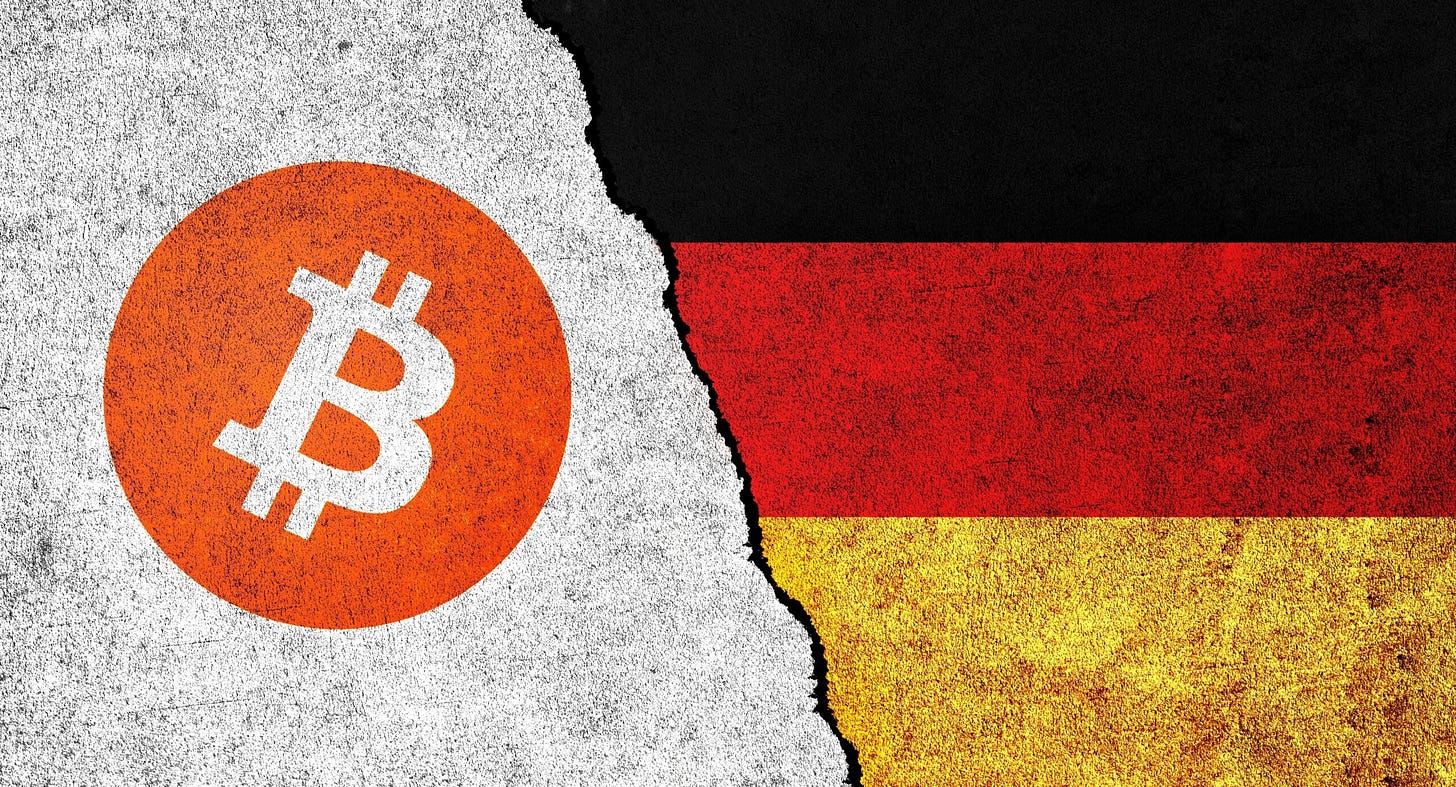🎯 Rep. Hill's Pick for the Next SEC Chair if Trump Wins
Weekly News Recap: 🪙 Germany’s BTC sale, 📈 Mt. Gox distributions, 💰 Grayscale’s ETF fees, and more!
You are reading the Unchained Weekly newsletter, where we cover all the major news in the crypto space, providing insights into the market's latest trends, regulatory shifts, and technological advancements. Stay informed with your no-hype resource for all things crypto.
If you like Unchained: Refer us with a friend and earn a Premium subscription!
Congressman French Hill on Crypto and His Top Pick for the Next SEC Chair
Rep. French Hill, who is running to chair the House Financial Services Committee, reveals his preference for the next SEC Chair if Trump wins, gives his odds on a crypto bill passing by year’s end, and says he supports the CFTC regulating spot crypto markets.
In this episode of Unchained, Congressman French Hill provides an insider’s perspective on the present and future of crypto regulation.
Hill delves into the ongoing legislation and the implications of the FIT21 Bill, shares his views on who should succeed Gary Gensler as SEC Chair if Trump is re-elected, and discusses the controversial role of the CFTC in regulating the crypto industry. He also touches on the potential impacts of the Chevron doctrine being overturned by the Supreme Court, Trump’s evolving stance on crypto, and the latest developments in the Binance executive detention case in Nigeria.
Listen to the episode on Apple Podcasts, Spotify, Pods, Fountain, Podcast Addict, Pocket Casts, Amazon Music, or on your favorite podcast platform.
Weekly News Recap
Germany’s BTC Sale Concludes as Mt. Gox Distributions Begin
Germany has finally concluded the sale of nearly 50,000 bitcoins, generating $2.88 billion. The sale, conducted with the support of the Federal Criminal Police Office and exchanges such as Bitstamp, Kraken, and Coinbase, was part of efforts to offload assets seized from the defunct piracy website Movie2K. Despite the continuing legal proceedings, German authorities said that "The sale of valuable items before the conclusion of ongoing criminal proceedings is always legally required when there is a risk of a significant loss in value."
In related news, Mt. Gox creditors have started receiving Bitcoin distributions. Kraken confirmed receiving Bitcoin and Bitcoin Cash transfers from the Mt. Gox Rehabilitation Trustee, with distributions expected to reach creditors within 7 to 14 days. The trustee has now reimbursed over 13,000 creditors, following a transfer of over 48,000 BTC to Kraken. In addition, bankrupt exchange BlockFi will start processing crypto distributions via Coinbase this month. However, non-U.S. clients are currently ineligible for the distributions due to regulatory constraints.
Meanwhile, on Tuesday, U.S. spot bitcoin ETFs saw substantial net inflows of $423 million, the largest daily amount since early June. BlackRock’s IBIT led the pack with $260 million, indicating strong investor confidence. This marked the eighth consecutive day of positive flows for bitcoin ETFs.
In addition, the Bitcoin ecosystem has been the top performer in the crypto market over the past week. Data from Artemis shows a 29% rise in the fully diluted valuation of the Bitcoin ecosystem sector, which includes projects such as Stacks, Core, ORDI, and SATS. The SEC's closure of its investigation into Stacks contributed to a 40% increase in its token, STX. "When Bitcoin goes on a run, it pulls up the entire market," said Charlie Hu, co-founder of Bitcoin L2 network Bitlayer.
Grayscale's Ethereum ETFs Will Charge Highest and Lowest Fees
Grayscale has announced a 2.5% annual fee for its primary proposed spot Ethereum ETF, which is roughly ten times higher than the planned fees of its rival Ethereum ETFs. The fee will apply after Grayscale converts its Grayscale Ethereum Trust (ETHE) into an ETF.
By contrast, other firms are offering significantly lower fees. Six out of the 10 ETFs that are waiting for approval will have fee waivers, and even without the waivers, they will all charge between 0.15% and 0.25%.
However, Grayscale is also launching the Ethereum Mini Trust, which will be priced much more competitively. Seeded with 10% of ETHE’s assets, equating to over $1 billion, the Mini Trust will waive its fees for the first six months or until it reaches $2 billion in AUM. After that, it will charge a 0.15% fee, the lowest of all.
State Street Explores Stablecoin and Deposit Token Initiatives
State Street, a financial services and banking giant based in Boston, is exploring blockchain-based payment settlements, according to a Bloomberg report. The firm, which recently reported higher-than-expected revenue and interest income, is considering creating its own stablecoin that would be pegged to an asset such as the dollar and run on a blockchain. Additionally, State Street is evaluating the development of a deposit token that would represent customer deposits on a blockchain, according to an anonymous source cited by Bloomberg.
State Street is also looking at joining digital-cash consortiums and exploring settlement options through its investment in blockchain payment startup Fnality, which is expanding into the U.S.
In related news, Hong Kong plans to introduce stablecoin legislation by the end of the year, following the conclusion of a public consultation on the matter.
Indian Exchange Halts Withdrawals After $230 Million Hack
WazirX, an Indian cryptocurrency exchange, experienced a major security breach resulting in the theft of approximately $230 million in crypto assets. The hack targeted one of the exchange's multisig wallets, leading to significant losses in various cryptocurrencies including Shiba Inu (SHIB), Ethereum (ETH), and MATIC.
In response, WazirX temporarily paused all withdrawals of both cryptocurrencies and Indian Rupees (INR) to safeguard user funds. The incident was initially detected by cybersecurity firm Cyvers Alerts, which observed the unauthorized transfers.
The attacker converted the stolen assets to Ethereum and utilized crypto mixer Tornado Cash to obscure the transaction’s origins. Despite the breach, WazirX has resumed operations, confirming that the protocol is now fully operational. The exchange is collaborating with law enforcement and industry experts to recover the stolen funds and ensure enhanced security measures.
LI.FI Suffers $10 Million Theft
On Tuesday, decentralized finance (DeFi) protocol LI.FI, experienced a hack resulting in a loss of over $10 million. The attacker exploited a vulnerability in a smart contract, targeting wallets set to infinite approval settings. The compromised funds were swiftly moved through various transactions, including interactions with decentralized exchanges such as Uniswap.
LI.FI promptly addressed the exploit by disabling the affected smart contract facet. In a tweet, the team assured users, "There is currently no further risk to users. The only wallets affected were set to infinite approvals, representing a very small number of users."
Following the incident, the LI.FI team announced the protocol is fully operational again. "Bridging and swapping on most of our partner protocols have resumed," they tweeted, adding that they are continuing to collaborate with law enforcement and industry participants to trace and recover the stolen funds.
FTX and CFTC Agree to $12.7 Billion Settlement
Bankrupt crypto exchange FTX and the U.S. Commodity Futures Trading Commission (CFTC) have reached a $12.7 billion settlement agreement. The settlement, pending approval from a Delaware judge, was disclosed in a court document filed last Friday, following months of negotiations.
According to the filing, the settlement resolves ongoing litigation and disputes with the CFTC, one of FTX's largest creditors. The CFTC has agreed to forgo any recovery as long as FTX adheres to its reorganization plan. Consequently, FTX will distribute up to $12.7 billion to its creditors, depending on the available funds.
Andy Dietderich, lead counsel for FTX, said that the CFTC's decision to forego its claim is intended to increase recoveries for customers and lenders. The settlement includes $8.7 billion in restitution and $4 billion in disgorgement, with the latter subordinated to the payment of other creditor claims. A hearing on the settlement is scheduled for August 6.

Dutch Court Denies Bail for Tornado Cash Developer
A Dutch court has denied bail to Tornado Cash developer Alexey Pertsev as he prepares to appeal his money laundering conviction. In May, Pertsev was found guilty of laundering $2.2 billion through the crypto mixer and sentenced to 64 months in prison. His lawyers argued that Pertsev needs access to a computer and the internet to prepare his defense, but the court maintained that his pre-trial detention does not hinder his ability to prepare.
Despite the legal team's efforts, including presenting an 18-point plan to highlight the technical complexities of the case, their request for digital facilities for Pertsev while in prison was also rejected. Pertsev has been a critical figure in understanding the DeFi technicalities involved in the case. His defense continues to argue for his release so that he can better prepare for the appeal.

SEC Ends Investigation of Bitcoin L2 Stacks and Hiro Systems
The U.S. Securities and Exchange Commission (SEC) has concluded its investigation into blockchain software developer Hiro Systems, previously known as Blockstack. The three-year probe, which examined $70 million raised through token sales from 2017 to 2019, ended without recommending enforcement action against the company. The decision follows the SEC recently ending investigations into stablecoin issuer Paxos and software development firm Consensys, marking another loss for Gary Gensler’s agency.
Hiro, which develops tools for the Stacks Layer 2 blockchain, welcomed the news. Muneeb Ali, co-creator of Stacks and the CEO of Trust Machines, confirmed that the SEC’s inquiry included the Stacks protocol. Hiro had initially treated its tokens as securities but claimed in 2021 that the network had become fully decentralized, meaning it no longer required this classification.
Polygon Schedules MATIC to POL Token Migration
Polygon announced that its long-awaited token migration from MATIC to POL will occur on September 4. POL will replace MATIC as the gas and staking token on the Polygon PoS network. Testnet migrations began on July 17.
MATIC holders on Ethereum, Polygon zkEVM networks, or centralized exchanges may need to migrate tokens to POL, while those on the Polygon PoS chain will have their tokens automatically upgraded. This migration is part of Polygon’s AggLayer overhaul, which aims to create a unified ecosystem using the Polygon Chain Development Kit.









